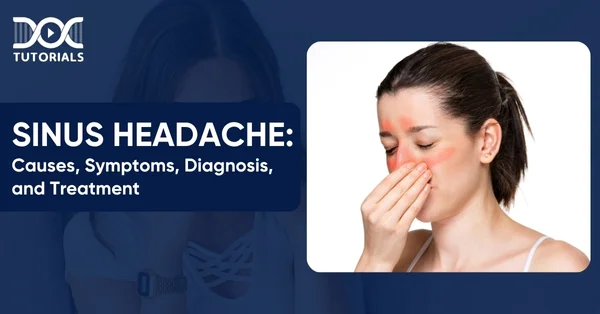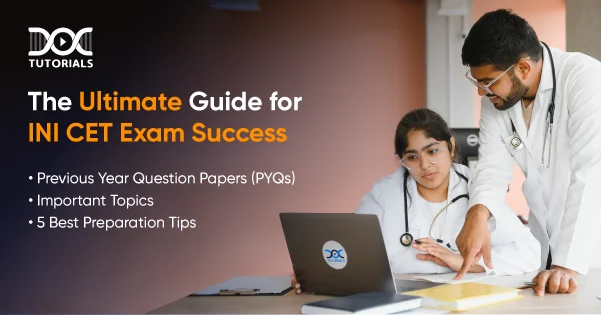Sinus Headache: Causes, Symptoms, Diagnosis, and Treatment

Sinus headaches are one of the most common health concerns, affecting approximately 12.5% of people in India. It often results in inflammation and congestion in the sinuses due to infections, allergies, or environmental irritants.
This type of headache typically manifests with facial pressure, nasal obstruction, and pain over the forehead, eyes, or cheeks. Timely identification of sinus headaches is essential for proper treatment and to avoid possible complications.
Besides, it is essential to understand sinus headaches, especially if you are a medical student preparing for the NEET PG exam. Keep reading to learn more about the causes, symptoms, diagnosis and treatment of sinus headaches.
What is a Sinus Headache?
A sinus headache results from inflammation or infection in the sinuses—air-filled cavities in your forehead, cheekbones, and the area behind your nose. When these sinuses are inflamed because of allergies, infections, or irritants, they release excess mucus and prevent normal drainage.
This can lead to pressure buildup, resulting in a dull, constant pain behind the eyes, forehead, nose, or cheeks. The pain may also worsen if the person leans forward or quickly moves the head. Usually, sinus headaches improve once the underlying sinus issue is resolved.
What are the Causes of a Sinus Headache?
Sinus headaches typically result from blocked and inflamed sinuses that can fill with fluid, leading to facial pressure from the sinuses and pain. Listed below are the sinus headache causes:
- Viral Infection: It is the most common cause of a sinus headache and sinusitis.
- Fungal Infection: Although less common, this condition may affect individuals with weakened immune systems, resulting in chronic or severe sinus headaches.
- Bacterial Infection: Bacterial sinusitis can usually develop after a viral sinus infection. The bacteria thrive in a sinus that is filled with trapped mucous, producing gas in the various sinuses that can increase the sinus pressure.
- Seasonal Allergies (Allergic Rhinitis): Seasonal allergies cause inflammation and swelling of the sinus linings, resulting in recurrent sinus headaches.
- Environmental Irritants: Exposure to second-hand smoke, strong perfumes, air pollution, and other chemical fumes may irritate the nasal passages and sinuses.
- Air Pressure Change: Changes in altitude or pressure can affect the sinuses and create headaches without infection. Sudden shifts in pressure, such as those experienced during a flight journey or while driving, can trigger headache symptoms.
What are the Risk Factors of a Sinus Headache?
Understanding the major risk factors associated with sinus infections could potentially alleviate the chances of experiencing sinus headaches. Below are the prevalent risk factors:
- Anyone suffering from the common cold.
- Individuals experiencing seasonal allergies.
- People engaging in smoking or being exposed to passive smoke.
- People having structural abnormalities in their sinuses, such as nasal polyps or a deviated septum, may lead to mucus accumulation in their sinuses.
- Those who use nasal spray/drops excessively.
- Anyone with cystic fibrosis.
- Individuals with a compromised immune system or those using medications that impair immune function are more susceptible to infections, including sinus infections.
What are the Symptoms of a Sinus Headache?
Sinus headaches are characterised by a blend of cranial discomfort and sinus-related symptoms resulting from obstructed or inflamed sinuses. Typical sinus headache symptoms include:
- Intense, persistent pain in the forehead, cheeks, or the bridge of the nose
- Facial pressure or swelling
- Discomfort that intensifies when bending forward or making sudden head movements
- Nasal congestion or a blocked nose
- Thick yellow or green nasal discharge
- Pain or pressure around the eyes, frequently accompanied by watery or reddened eyes.
- Runny nose and diminished sense of smell
- A sensation of fullness in the ears
- Fever (particularly in cases of sinus infection)
- Fatigue and body aches
How to Diagnose a Sinus Headache?
Following are the key methods adopted in order to diagnose sinus headaches and infections:
- Clinical Evaluation
A diagnosis of a sinus headache starts with an in-depth questioning of your symptoms and a physical exam. Your doctor will evaluate facial tenderness, nasal stuffiness, and headache patterns to see if the pain is due to sinus problems or could be a different kind of headache, such as a migraine or tension-type headache.
- Imaging Tests
If the diagnosis is uncertain or the symptoms persist, imaging may be recommended. A CT (computed tomography) scan creates detailed cross-sectional images of the sinuses to detect inflammation or obstruction.
An MRI (magnetic resonance imaging) test can also be conducted to determine the reasons for the headache, particularly if neurological symptoms are present. Apart from these, nasal endoscopy or referral to an ENT (ear, nose, and throat) specialist is often necessary to ensure sinus involvement.
What is the Treatment for a Sinus Headache?
Here are some of the best ways to treat a sinus headache:
- Take over-the-counter medications, such as ibuprofen or acetaminophen, to help relieve facial pain and inflammation.
- Use steam inhalation or warm compresses to help drain your sinuses and relieve sinus pressure.
- Utilise decongestants, such as pseudoephedrine (oral) or oxymetazoline (nasal spray). However, limit nasal spray use to no more than 2-3 days.
- Use a saline nasal irrigation or rinse (e.g., a neti pot or saline spray) to remove mucus and allergens from your nasal passages.
- For most bacterial sinus infections, the doctor may prescribe antibiotics only if the symptoms are severe or affect daily life. Antibiotics are usually only prescribed after 7–10 days off of symptoms with no improvement.
- Use antihistamines or nasal corticosteroids as prescribed if the headache is due to allergies. This may decrease the inflammation in the sinuses.
- For chronic or recurrent sinus headaches, surgery may be necessary to address structural issues, such as a deviated septum or to remove nasal polyps.
FAQs About Sinus Headache
- How long does a sinus headache typically last?
Most sinus headaches resulting from viral infections usually recover within 7 to 10 days, generally improving as the infection naturally diminishes.
- How can I alleviate sinus pain?
You can relieve sinus pain by alleviating inflammation and congestion through techniques like steam inhalation, warmth compresses, saline irrigations, and over-the-counter painkillers or decongestants.
- What is the most effective exercise for a sinus infection?
Low-impact physical activities, such as walking, jogging lightly, or practising yoga, can improve circulation and ease sinus congestion. Strenuous exercise should be avoided because it could worsen symptoms or slow down the recovery process further.
- What causes sinus headaches?
Sinus headaches frequently arise from a sinus infection or sinusitis. They can also be triggered by allergies, chronic inflammation, or structural problems, such as nasal polyps.
- What are the consequences of leaving sinus headaches untreated?
Although minor sinus headaches may clear up on their own, not treating them sometimes leads to significant complications. Although infrequent, the infection can be transmitted to the eyes, brain, or the bone surrounding the sinus and can become life-threatening.
Accurate diagnosis and management of sinus headaches are imperative to prevent complications and enhance quality of life. Right from medications to surgeries, knowing the underlying cause decides the ideal course of treatment.
For NEET PG aspirants, being proficient in such clinical topics is essential. DocTutorials provides in-depth study materials and high-yield visual concepts that streamline complex topics and enhance medical knowledge.
Join DocTutorials and explore our NEET PG course to excel in your medical career!
Latest Blogs
-

NEET PG Exam 2025- Date, Pattern, Marking Scheme, Subject Wise Weightage, and Exam Mode
NEET PG Exam 2025 is the ultimate gateway for medical graduates aspiring to pursue postgraduate courses in medicine, including MD,…
-

INI CET Exam 2025: Your Roadmap to Success – Key Topics, Strategies, and Lessons from Last Year’s Papers
The INI CET exam is more than just a test; it’s a significant milestone for many medical students aiming to…
-

INI CET Exam Success: Previous Year Question Papers & Ultimate Guide – INI CET PYQ
One can feel overwhelmed while preparing for the INI CET (Institute of National Importance Combined Entrance Test). A vast syllabus,…




